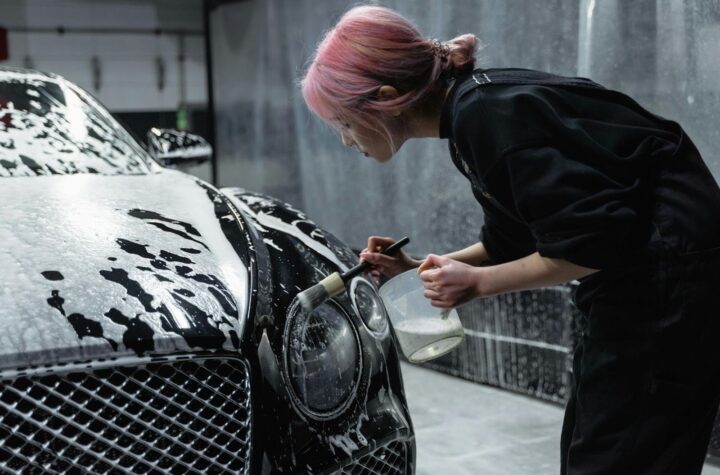
Image credit: https://www.pexels.com/photo/grey-mercedes-benz-convertible-193994/
Buying a car is one of the most significant financial investments most of us make. If you’ve saved for months or years to purchase a new or used vehicle, it’s understandable to want to protect your investment. The vast majority of cars will lose value with time, but there are ways to boost your chances of getting the best sale price and retaining as much value as possible. In this guide, we’ll outline some essential steps for car owners.
Cleaning and maintenance
Regular cleaning is one of the simplest and most effective ways to keep your vehicle looking great, but it can also help to reduce the risk of cosmetic imperfections, such as scratches and scuffs. You can clean your car yourself or make use of professional vehicle cleaning services. If you prefer the DIY approach, it’s important to invest in the right supplies and equipment. Essentials, such as soft cloths, will help you achieve a basic clean, but you can elevate results with specialist tools like a power waxer. It’s important to avoid using any abrasive chemicals or cleaning utensils to preserve the paintwork. If you use professional services, ask for recommendations and read reviews before choosing which company to hire.
Cleaning and polishing are important for vehicle maintenance, but they also boost saleability. If you’re selling your car, either to a dealership or via a private sale, it’s beneficial to ensure it looks its best. A smart, shiny vehicle will stand out for the right reasons whether you list it online or take it to a garage.
In addition to frequent cleaning, it’s also important to prioritize maintenance and upkeep. Follow the manufacturer’s instructions to ensure you’re familiar with the schedule for checks and repairs, such as oil changes and brake services.
Vehicle servicing
Keeping on top of servicing is crucial for safety and consistent performance levels, but it also impacts the value of the vehicle. A 2024 survey revealed that over 70% of motorists have made a conscious decision to invest more effort in upkeep due to rising vehicle costs. If you have a full service record, your car will retain more value than a vehicle that hasn’t been serviced regularly. Check the service recommendations for the make and model and try to stay up to date. Most cars need to be serviced periodically with a schedule set by the number of miles. Services include a series of checks, which can help to maintain high levels of performance and flag issues that need addressing or rectifying. Another key benefit to regular services is a lower risk of damage and faults, which will save you money in the long run and make the vehicle more attractive to prospective buyers or dealers.
If you buy a vehicle from a dealership or direct from a manufacturer, you may receive reminders when your service is due. If you don’t get reminders, keep an eye on the dashboard and make a note of when the next service is due. Typically, manufacturers recommend a service once a year or every 10,000-20,000 miles, depending on the age of the vehicle and its condition.
When you take your car in for a service, always keep a record. The service should be logged, along with any repairs undertaken.
Careful driving
Driving carefully can help you lower the risk of road accidents and injuries, but it’s also critical to retain value in your vehicle. If you’re a careful driver, you’ll be less likely to damage your vehicle in a crash or collision. Always abide by the rules of the road. Studies show that most crashes are caused by driver errors, including speeding, not looking before maneuvering, distracted driving, driving under the influence and failing to spot hazards. It’s also important to take care when parking your car. If you try to squeeze into a spot that’s too small, or you miss bollards, fences or curbs, you could scratch the paintwork, damage the wheels or hit the bumper. Try to avoid any gaps that look too tight and give other people plenty of space to reduce the risk of them hitting your car when they park or try to get back into their vehicle.

Picture from https://www.pexels.com/photo/smiling-woman-sitting-inside-the-car-7144214/
Seek professional advice for faults and vehicle damage
Prevention is always better than cure when it comes to vehicle repairs, but it’s not always possible to avoid scrapes, crashes or mechanical faults. If you damage your car, you have concerns about how it’s running or you notice warning lights or unusual noises, seek professional advice at the earliest opportunity. It’s always better to get minor problems checked out than to leave them untreated. Small issues can develop into more complex problems, which are more expensive and difficult to fix.
If you need vehicle repairs, take time to research auto repair shops and choose a reputable, accredited business. It’s wise to opt for mechanics who come recommended by the manufacturer. Research companies, read reviews and compare quotes before you make a decision. If you’re having parts replaced, always choose the best-quality components you can afford. Keep a record of any repairs or modifications, including receipts and vehicle logs. This will enable you to show a dealer or a private buyer evidence of work when you sell the car.
Research prices and market trends
If you’re selling your car, it’s natural to want to get the best offer. Researching prices and market trends can provide insights into market values, the popularity of certain makes and models and the demand for new and used cars. It’s beneficial to go into a negotiation with an accurate idea of how much your car is worth. Shop around, get several quotes and be prepared to fight your corner if you think the valuation or offer is too low. You should never feel pressured to sell if the price isn’t right. Getting your timing right can help you earn more. If your vehicle is in demand, for example, selling when prices are peaking is a good idea.

Image via https://www.pexels.com/photo/shaking-hands-over-car-7144204/
For many of us, buying a car represents a significant financial investment. If you own a vehicle, it’s understandable to want to protect your investment and retain as much value as possible. Simple steps can make a big difference. Examples include regular cleaning and maintenance, keeping up with scheduled services, driving carefully and seeking expert advice if you have any concerns or worries about your vehicle.





More Stories
How Diesel Pickups Are Outperforming Gas Trucks on Tough Jobs
Meet Rita Case – recipient of 2024 NAMAD Lifetime Achievement Award
Automotive Industries (AI) Newsletter October 2024